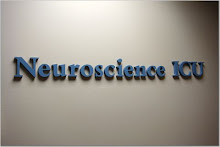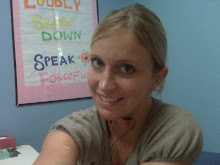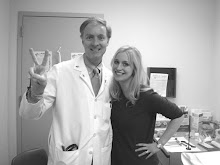I know a blog is a diary.... and I doubt this posting will someday become a real "blog" but I just want to get my story out there as soon as possible.
I would like to draw attention to something that happened to me. Although it could make for an interesting story to read (almost like an episode from “House”), I am really just looking to help spread the word so that my condition could be better diagnosed in someone else. The more I tell my story, the more I hear about other similar cases. I would love to help spread the word about stroke in young adults, and the importance of an accurate and quick diagnosis.
I am a healthy and happy 32 year old that suffered from a stroke on Thursday, November 29th, 2007. It was not diagnosed as a stroke until Saturday, December 1st – after countless tests, exams and scans. The fact that it took almost 48 hours to diagnose my stroke still haunts me – I know I am extremely blessed and fortunate to be alive.
Four weeks prior to my stroke – on Halloween morning, I woke up with a terrible throbbing headache in the back of my head. It really felt like there was something wrong with me, so I went to my primary care physician. She diagnosed me with a sinus infection and prescribed an antibiotic. She explained that sinus infections in the back of the head are rare but do occur. My other symptoms disappeared after I finished the antibiotic, but I still had a strange throbbing in the back of my head – sometimes several times a week. I took Tylenol and told myself I would go back to the doctor after Thanksgiving.
I was first admitted to the emergency room on the morning of Thursday, November 29th. I woke up that morning feeling dizzy, hot and clammy. The headache in the back of my head was severe, and I had tingling in my arms and legs. I just didn’t feel like I was in my own body. I had some trouble getting my words out when I spoke. Somehow I managed to take my 8-month-old son to his daycare. His teacher commented on the fact that I was shaking – this I had not realized. I called my mom and explained my morning to her and she said that I sounded strange on the phone. A few moments after our conversation, I choked on my breakfast and suddenly had the sensation that my throat was closing.
I panicked and had somebody call 911. When the paramedics arrived, they said that perhaps I was having a panic attack – although there is no history of these attacks in my family. They took me to the emergency room where I passed the stroke test, and had both a CT scan and an x-ray. I was eventually released with the diagnosis of “panic attack and possible sinusitis.” Upon returning to work, I looked in the mirror and noticed one of my eyes appeared smaller than the other – like one side of my face was a bit droopy. I still didn’t feel like myself.
That night – actually, around 3 am – I woke up with another “hot flash” feeling. I figured this was another “panic attack” so I took a sip of water – but this time choked terribly. It was though I had poured the water directly into my lungs. I could not catch my breath or speak. I remember banging on my bedroom mirror as I looked at myself in horror. I really felt like I was going to choke to death. I could barely mouth the words “911” to my husband. Over the next several minutes before the paramedics arrived, I was able to cough up the water and catch my breath. I could talk, but I could not think clearly.
This time the trip to the hospital was different. I kept vomiting and could not swallow my own saliva. I think I made a terrible mess of the ambulance. I can barely remember the faces around me. When I got to the ER, I kept alternating spitting and puking into a bowl. I was choking on vomit so they gave me some anti-nausea medicine. Everybody seemed quite puzzled with my condition. I was the girl who could not swallow. I could not tell them what was wrong and I was getting more and more frustrated. I felt a million miles away from my own body. I don’t remember being in any pain, just terrified that I could not swallow. I was in extreme discomfort.
After about 12 hours of tests - and waiting - in the emergency room, I was placed in a room with a roommate on the 8th floor. The poor lady next to me! The next few hours seemed like the longest in my life. I think I finally saw my doctor at 4pm, and I barely remember the specialists she had almost immediately at my bedside. The ENT stuck a small scope up my nose and down my throat but did not see anything strange. The Gastroenterologist said the same – nothing he could do. At around 7pm, the neurologist arrived – and this is when things really got scary. She quickly determined that I was in far worse condition than anyone thought. After her exam, she called the Rapid Response team to take me to the Neuroscience Intensive Care unit. Suddenly everything changed for me. I was the center of all the attention and had at least 5 nurses and specialists around me at all times. They were all still puzzled – nobody said the word “stroke.”
I don’t remember much of what happened next. I do remember that they were talking about a possible infection of my brain stem. I remember being told that I needed an MRI in order to be properly diagnosed, but I could not hold still long enough to get one because I was constantly spitting into a bowl. The decision was made to put me to sleep and intubate me for the MRI, so that I would remain motionless for an extended period of time while on a breathing machine.
When I awoke, I coughed on my breathing tube. I had to write on a piece of paper in order to communicate. A doctor blurted out that I had had a stroke – he assumed somebody else had already told me. I remember feeling relieved that we had finally found the cause for my suffering. I felt like the scary part was all behind me, but I was wrong. The stroke occured in my brainstem - causing Lateral Medullary Syndrome (Wallenberg's Syndrome) & Horner's Sydrome. As a result, I was completely unable to swallow and had other symptoms such as hoarseness, dizziness, hiccups, nausea and vomiting, and lack of pain and temperature sensation - numb limbs - on my right side, and also drooping upper eyelid, constricted pupil, and lack of pupil dilation on the left side of my face.
My stroke was a result of spontaneous Vertebral Artery Dissection. The doctors told me there was evidence of trauma to my left vertebral artery located in the back of my neck. According to VertebralArteryDissection.com : "Vertebral Artery Dissection is a dissection of the wall of the vertebral artery, leading to the formation of an aneurysm that may occlude the vessel...Cervical fractures or related neck injuries and craniocerebral trauma are commonly associated conditions, although this process may occur spontaneously. Ischemia, infarction, and hemorrhage in the vascular distribution of the affected vertebral artery may complicate this condition." There are many things that can cause an artery to dissect, but the exact cause of my artery dissection is unknown.
I spent almost 3 weeks in the hospital trying to recover and to re-learn how to swallow. I had speech therapists, physical therapists, neurologists, pulmonary doctors, and infectious disease doctors visiting me around the clock. I had to sleep propped up and continue to do so for fear of choking on my drool. A feeding tube was placed up my nose and down my throat, into my stomach. I had a “sucker” to use in my mouth to suction up my spit. I had a PIC line inserted into my arm for blood tests around the clock. I developed a type of aspiration pneumonia from saliva getting into my lungs. I was, of course, the youngest stroke victim that most of them had seen. Doctor after doctor would enter my room, turn around and walk out, check their chart and re-enter in shock. After two weeks, I made tremendous improvement with everything but my swallowing. The decision was made to surgically place a feeding tube in my stomach so that I could leave the hospital and feed myself nutrition shakes at home.
Fast forward a bit – I have been home for over 4 months now and am doing much, much better. I had to have a nurse come to my home for the first few weeks, and I was readmitted to the hospital for almost a week because of an infection at my feeding tube site. I underwent speech therapy using neuromuscular electrical stimulation for two months and finally learned to swallow well enough to have my feeding tube removed. I still have a lot of difficulty swallowing – especially liquids. I am still on coumadin, along with many other prescriptions, so I have to watch my diet and I bruise very easily. I don’t have much sensation in the right side of my body so I cannot feel much pain or any temperature. When I talk to strangers, I have trouble getting my words out quickly. I also have a small scar on my stomach from the feeding tube. These are small discomforts compared to the massive impact that my stroke has had on my life. I have a friend who suffered a stroke a few years ago. We had been out of touch for years, but she contacted me after learning of my stroke. She told me that I must look at this as a positive experience – and so I have. I take nothing for granted and am thankful for every day that I have. I pray daily, and make sure to tell people I love them. I literally stop and smell the roses. My life before was very rushed. I plan to never again live my life in “superwoman speed” – as my husband puts it. I used to be focused on so many things that did not matter.
Two days after I was able to go home, my husband asked me if I wanted to go to Tysons Corner Mall so that we could take our son to see Santa. I rejoiced at this opportunity. My husband pushed me through the mall in a wheelchair with my then 9 month-old on my lap and I could not stop smiling the entire time. Just a few months before, I don’t think I would ever have been seen in a wheelchair in public. However, I have learned that once you spend weeks walking up and down the hospital hallways with a feeding tube hanging from your nose and a bag of stuff hanging from your IV pull, any feelings of vanity disappear. It is great to realize that it is okay to go to the grocery store without mascara because I am just grateful to be able to go. I am so very thankful for everything. I try hard not to worry about the things in life that do not matter.
The more I learn about stroke in young adults, the more I learn that it is not as uncommon as you might think. We all start with similar symptoms: severe headache, dizziness, weakness in a limb or loss of sensation. We are so often misdiagnosed by physicians, EMTs and paramedics because we do not fit the profile of a “typical” stroke patient.
The American Heart Association states that stroke is the third largest cause of death and the leading cause of severe, long-term disability in the United States. According to the National Institute of Neurological Disorders and Stroke, stroke damage in the brain can affect the entire body - resulting in mild to severe disabilities. These include paralysis, problems with thinking, problems with speaking, and emotional problems. Every minute counts. The longer blood flow is cut off to the brain, the greater the damage. The most common kind of stroke, ischemic stroke, can be treated with a drug that dissolves clots blocking the blood flow. The window of opportunity to start treating stroke patients is three hours. But a person needs to be at the hospital within 60 minutes of having a stroke to be evaluated and receive treatment. In young patients, that window of opportunity is often missed.
The American Stroke Association wants everyone to learn the warning signs of stroke:
• Sudden numbness or weakness of the face, arm or leg, especially on one side of the body
• Sudden confusion, trouble speaking or understanding
• Sudden trouble seeing in one or both eyes
• Sudden trouble walking, dizziness, loss of balance or coordination
• Sudden, severe headache with no known cause
• Not all the warning signs occur in every stroke. Don't ignore signs of stroke, even if they go away!
• Check the time. When did the first warning sign or symptom start? You'll be asked this important question later.
• If you have one or more stroke symptoms that last more than a few minutes, don't delay! Immediately call 9-1-1 or the emergency medical service (EMS) number so an ambulance (ideally with advanced life support) can quickly be sent for you.
• If you're with someone who may be having stroke symptoms, immediately call 9-1-1 or the EMS. Expect the person to protest — denial is common. Don't take "no" for an answer. Insist on taking prompt action.
A person having a stroke can be the last one to realize that they are fumbling with balance or words. As I was talking to my mom that morning on the phone, she said my voice sounded slurred and yet I did not realize it at the time. Obviously, I did not know that I was having a stroke. Once my initial symptoms disappeared (the dizziness and hot-flash feelings) I didn’t push for somebody to diagnose me as having a stroke – I assumed that everyone around me knew everything. Looking back, maybe if I had been more familiar with the fact that strokes can happen to people in their 20s and 30s I might have refused to let the Emergency Room dismiss me. Their stroke test was so quick and obviously worthless to me. If I had known what I know now, I might even have pushed for an MRI/angiogram sooner. You never know, but if I could now help just one person to recognize stroke symptoms in themselves or in someone else it would be a wonderful thing.
Please help me to spread the word about stroke diagnosis.
Sources: http://www.vertebralarterydissection.com/,
http://www.americanheart.org/, http://www.strokeassociation.org/,
www.ninds.nih.gov (National Institute of Neurological Disorders and Stroke)
Subscribe to:
Posts (Atom)







